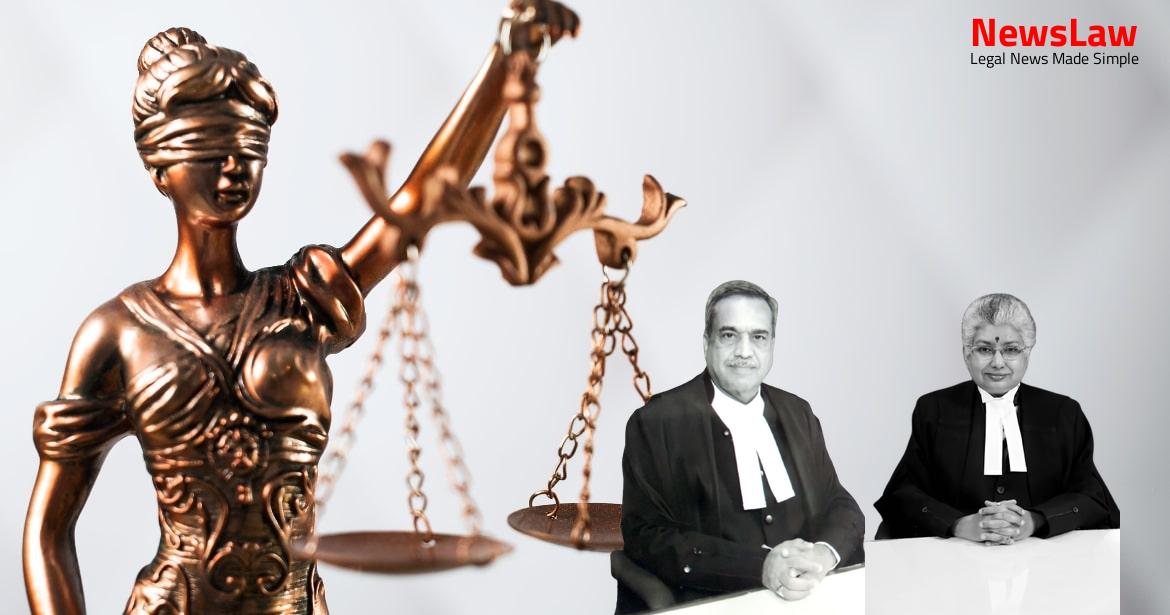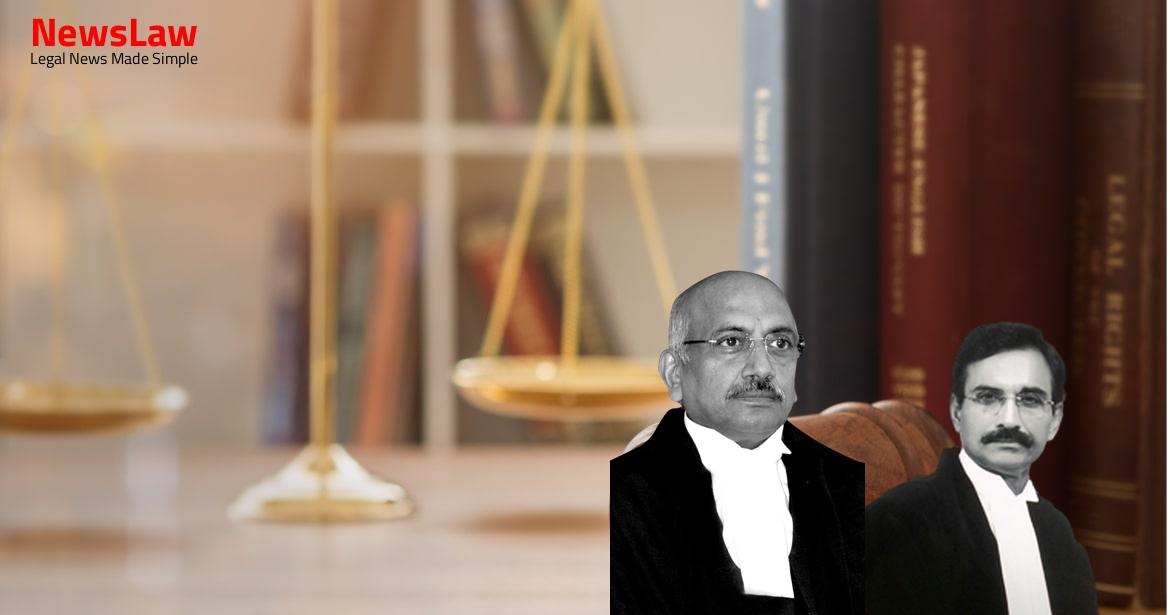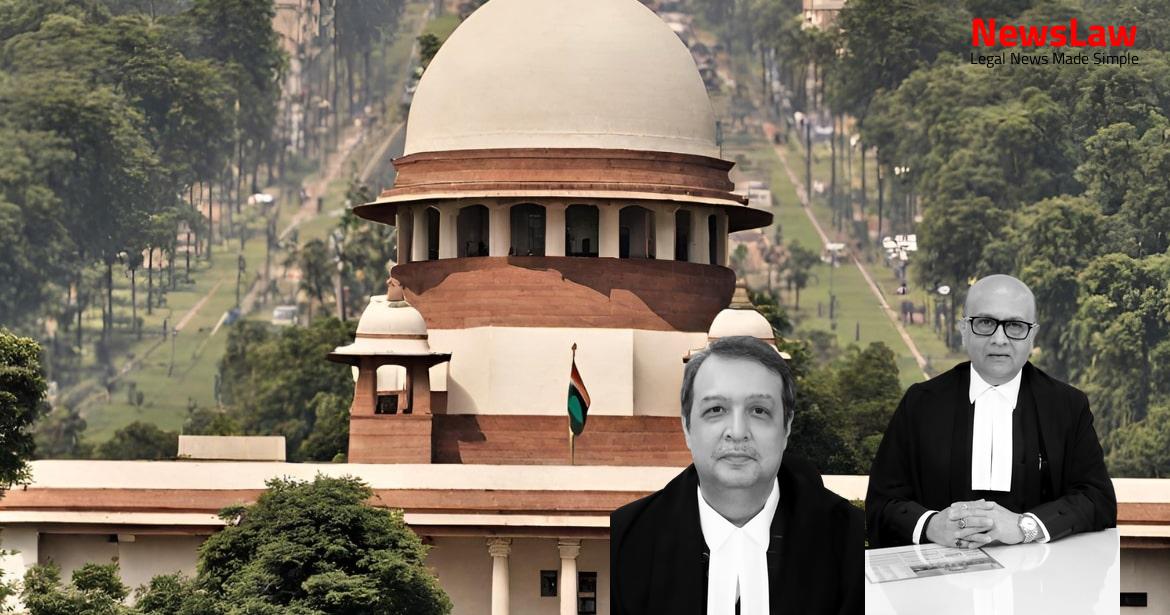In a significant legal development, the Supreme Court of India recently issued a judgment in a land dispute case involving specific performance. The case pertained to a dispute between the parties over a property agreement. The Court’s decision resulted in the modification of the specific performance decree, providing equitable relief to the parties involved. This ruling marks a crucial step in the resolution of this long-standing issue.
Facts
- The first plaintiff’s name was included as the purchaser in the suit agreement to deter the first defendant.
- The first defendant sold a part of the suit property to the second to fourth defendants by another sale deed in 1983.
- The suit was filed for specific performance of the agreement made in 1981 for the sale of the suit property.
- Allegations were made that subsequent sale deeds by the defendants were collusive.
- The first defendant’s legal representative contended that the suit agreement was fictitious.
- The first plaintiff and first defendant were relatives.
- The first defendant deposed in favor of the defendants, stating that the suit agreement was to prevent alienation of the suit land.
- An affidavit was filed expressing apprehension of the first defendant selling the suit property due to alleged bad habits.
- The operation of the impugned decrees was stayed by the Court in light of land reform regulations.
- The first plaintiff was examined as a witness in the case.
- The Uttar Pradesh Civil Laws (Reforms and Amendment) Act, 1976 made an agreement for sale compulsorily registrable in the State at the relevant time.
- The Trial Court found the execution of the suit agreement to be proven.
- The explanation to Section 3 of the Transfer of Property Act, 1882 deemed the second to fourth defendants to have notice of the suit agreement.
- Evidence contrary to the contents of the suit agreement was held to be inadmissible as per Section 92 of the Indian Evidence Act, 1872.
- The second to fourth defendants were found to not be bona fide purchasers for value received.
- A decree for specific performance was passed by the Trial Court, directing all defendants to execute the sale deed and deliver possession of the property to the plaintiffs.
Also Read: Judgment on Interim Stay of Bail Orders: The Case of Liberty vs. Judicial Discretion
Issue
- Can the contention that the suit agreement was sham and bogus and not intended to be acted upon be raised despite Evidence Act sections 91 and 92?
- Was the suit agreement indeed sham and bogus and not intended to be acted upon?
- Were the second to fourth defendants bona fide purchasers for value without notice of the suit agreement?
- Are the plaintiffs entitled to a decree of specific performance considering the absence of a prayer for cancellation of the subsequent sale deeds?
- Do the provisions of the Zamindari Abolition Act create a bar on the execution of the sale deed as per the suit agreement?
Also Read: Zaveri & Co. Pvt. Ltd. vs. ACIL: Legal Precedent on Guarantor Liability
Arguments
- The senior counsel relied on the Privy Council’s decision in the case of Tyagaraja Mudaliyar and Anr. v. Vedathanni.
- Depositions of the second plaintiff and Bhagwati Devi indicated the first defendant’s vices and the fear of property sale.
- Second plaintiff, Murari Singh, approached by Bhagwati Devi to prevent first defendant from selling the property.
- Counsel cited a decision in the case of Krishnabai Bhritar Ganpatrao Deshmukh v. Appasaheb Tuljaramarao Nimbalkar & Ors.
- Second to fourth defendants claimed to be bona-fide purchasers as per counsel’s submission.
- Plaintiffs’ shares were not defined in the agreement to sell, hence deemed to have equal shares under Section 45 of the Transfer of Property Act.
- Specific contention that the suit agreement was sham has been dismissed by the three Courts.
- First plaintiff filed the suit shortly after the first defendant executed a sale deed in favor of the second to fourth defendants.
- The senior counsel for second to fourth defendants argued that the suit agreement being sham was not considered by the three Courts.
- Section 91 and 92 of the Evidence Act do not exclude evidence to show the suit agreement was bogus or sham as per counsel’s argument.
- High Court recorded submissions of counsel for second to fourth defendants regarding suit maintainability and admission by Murari Singh.
- Learned senior counsel argued that the plaintiffs are disentitled to relief of specific performance as they did not pray for setting aside or cancelling the subsequent sale deeds in the plaint.
- Section 154-B of the Zamindari Abolition Act was cited to emphasize that as the first plaintiff is not an agriculturist, a sale deed in terms of the suit agreement cannot be executed.
- It was pointed out that the legal representatives of the first respondent did not contest the appeal despite being served notice.
- The appeal was contended on the grounds that since Murari Singh did not institute the suit, the decree for specific performance for the entire undivided land was deemed erroneous.
- The decree was partially allowed, restricting it to only one half undivided share in the suit property in favor of the first plaintiff.
- The modified decree directed the execution of a sale deed in favor of the first plaintiff for the specified share within a stipulated timeline and subject to obtaining permission under the Zamindari Abolition Act.
- If the permission is not granted, provisions for refund and liability of the legal representative were outlined.
- If permission is granted, conditions for execution of the sale deed were specified.
- It was stated that even if the sale deed is executed, the first plaintiff cannot seek possession through the decree and must file a separate suit for general partition.
- The appeal was partly allowed with no order as to costs.
Also Read: The Disputed Quarrel: Legal Analysis of the Case Involving Muthu and Kesavan
Analysis
- The agreement for sale was not acted upon and was not disclosed at any time.
- The consideration amount in the agreement was significantly lower than the market price.
- Section 91 of the Evidence Act excludes oral evidence for the terms mentioned in a written document.
- The first defendant’s addiction to vices was claimed for the first time by the mother in her evidence.
- The agreement for sale did not transfer the property subject matter to the purchaser.
- An agreement for the sale of immovable property became compulsorily registerable under the UP Civil Laws Act 1976.
- The second to fourth defendants were deemed to have knowledge of the suit agreement.
- The second to fourth defendants did not plead the reason for getting the agreement executed from the first defendant.
- The bar of Section 16(c) was found applicable, leading to a lack of readiness and willingness for specific performance.
- The second to fourth defendants were not considered bona fide purchasers due to constructive notice.
- The High Court correctly applied Section 16(c) and dismissed the suit due to lack of readiness and willingness.
- The embargo under Section 154-B applied only to the execution of the sale deed and not the agreement for sale.
- The plaintiff did not request cancellation of the two conveyances of the same property.
- The suit agreement was claimed to be forged by the second to fourth defendants.
- The plaintiffs were not entitled to relief based on the forged document.
- The plaintiffs did not pray to cancel the subsequent sale deeds executed by the first defendant.
- Section 92 excludes oral evidence contradicting terms of a written document.
- The proper form of decree would be specific performance of the contract between the vendor and the plaintiff.
- The subsequent transferee should join in the conveyance to pass on the title to the plaintiff.
- The court can pass a decree enjoining the defendants to obtain permission to sell the suit property as it is their implied obligation.
- The contract was for a transfer of the sir lands without reservation of the right of occupancy, necessitating the sanction of the Revenue Officer.
- In certain cases, the court can order cancellation of a subsequent sale and conveyance to the plaintiff by the vendor in accordance with the contract of sale for specific performance.
- It would be illogical from a conveyancing perspective to compel the vendor to convey to the plaintiff without revesting the title in him through cancellation of the subsequent sale.
- A decree for specific performance can be contingent upon the grant of permission for transfer of the property.
- An implied covenant exists in contracts to do all things necessary to give effect to the agreement, including obtaining permission for property transfer.
- The courts have jurisdiction to enforce contracts under specific laws even when government sanction is required for property transfer.
- The decision in the specific case mentioned is not a binding precedent.
- The principles of implying terms in contracts are well-settled and based on the presumed intention of the parties for efficacy.
- The appellants in this case rely on the decision of the court in B. Vijaya Bharathi.
- The decision in B. Vijaya Bharathi is considered significant by the appellants.
- The appellants suggest that their case is similar to the case of B. Vijaya Bharathi.
- The reliance on B. Vijaya Bharathi is highlighted by the appellants to support their case.
- Sale of agricultural land to a non-agriculturalist is prohibited under sub-section (1) of Section 154-B.
- Permission from the State Government is required for the sale to a non-agriculturalist under clause (h) of sub-section (2) of Section 154-B.
- Specific Relief Act Section 19(b) allows for specific performance of a contract against subsequent parties unless they are bona-fide purchasers without notice of the original contract.
- Decree of specific performance can be passed against subsequent purchasers who fail to prove they acted in good faith without notice of the original agreement.
- Subsequent purchasers can be directed to execute the sale deed along with the original vendor under the specific performance decree, without canceling the subsequent sale deeds.
Case Title: MAHARAJ SINGH . Vs. KARAN SINGH (DEAD) (2024 INSC 491)
Case Number: C.A. No.-006782-006782 – 2013



